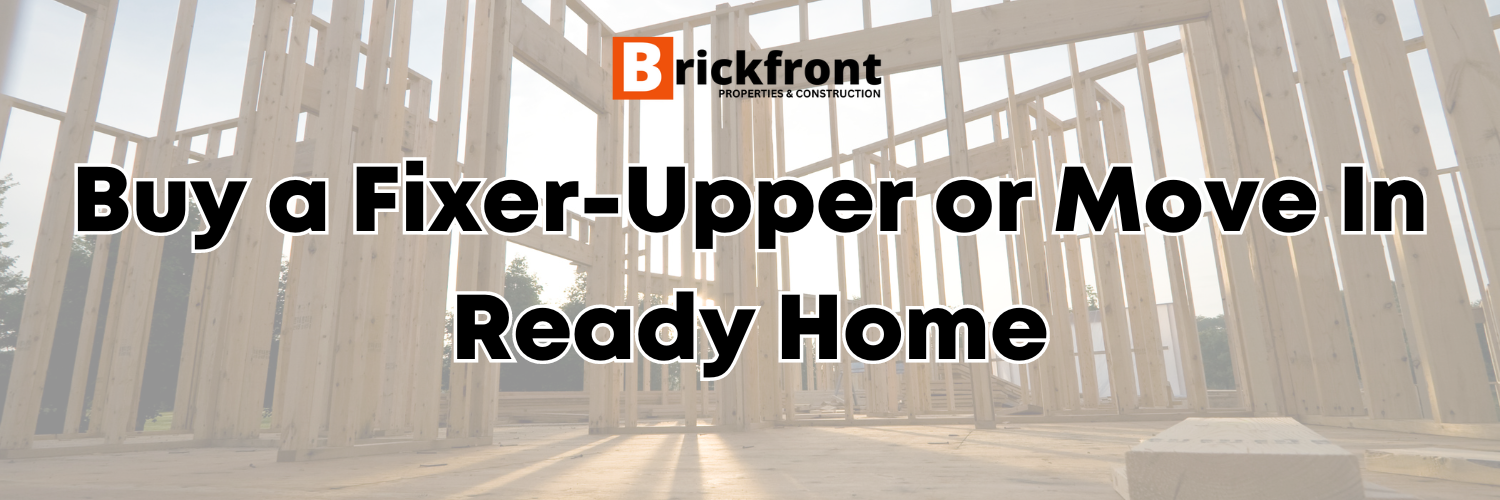
You will soon notice the differences in conditions between the properties as you begin your home search in your preferred neighborhood. Certain homes are move-in ready for any buyer, with recently painted walls and brand-new carpet. Some homes require a bit more maintenance.
A fixer-upper may require repairs and cosmetic improvements, or it may have major structural issues. Although purchasing a fixer-upper can help you save money, the cost of repairs may end up being higher than that of a move-in-ready house. Which one are you going to pick?
The decision of whether to buy a fixer-upper or move-in ready home is one of these crucial considerations.
The response is contingent upon your particular situation. A fixer-upper that needs home renovation may be a good investment for those looking to save money and add value. Some could be better suited to a turnkey property where they can move in immediately after closing.
Before considering a home purchase, Brickfront Property and Construction‘s subsidiary, Local DC Construction, helps you weigh the benefits and drawbacks to ensure your new house fulfills every one of your dream home visions.
What Are Fixer-Upper Homes and a Move-In Ready Home?
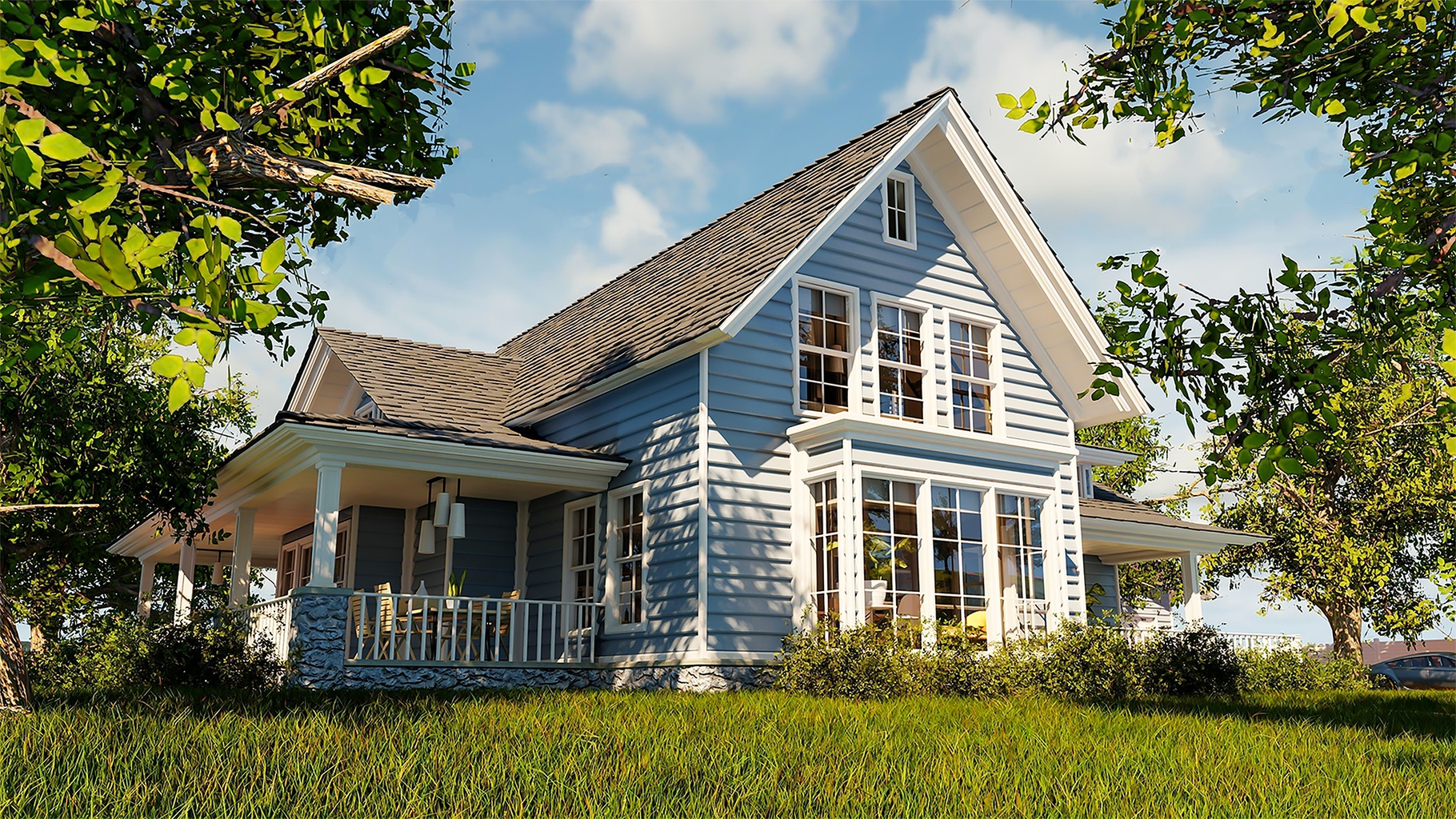
It’s useful to know what a fixer-upper and move-in ready home are before you embark on your exciting home-buying journey. Let’s examine how these two possibilities differ from one another.
What is a Fixer Upper?
Fixer-uppers require significant repairs, restorations, or remodeling. They frequently have worn-out infrastructure, old features, or aesthetic defects. Although buying fixer-uppers may seem like a daunting task, it also gives purchasers a chance to express their creativity, make the space uniquely their own, and maybe raise the property’s value.
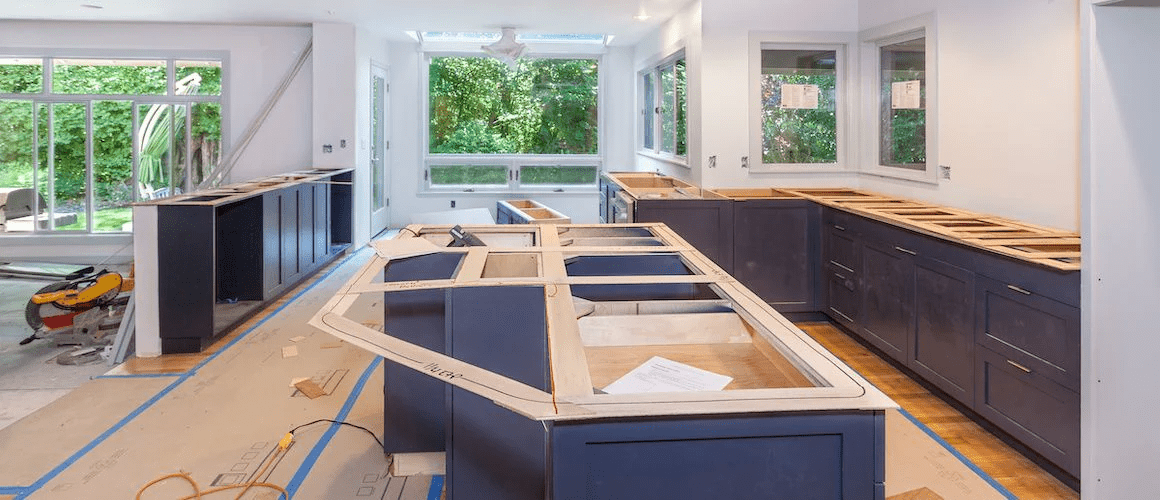
One tactic used by many real estate investors while looking to buy a fixer-upper is to drive around neighborhoods of interest and search for possible properties in need of repair.
What is a Move-In Ready Home?
Conversely, a ready-to-occupy home needs little to no cosmetic repairs or home improvement projects for you to live comfortably there. It is a well-maintained property. These houses are frequently kept up to date, ready for immediate occupancy, and updated. Move-in ready homes let purchasers avoid the time-consuming and occasionally stressful renovation process, providing them with convenience and peace of mind.
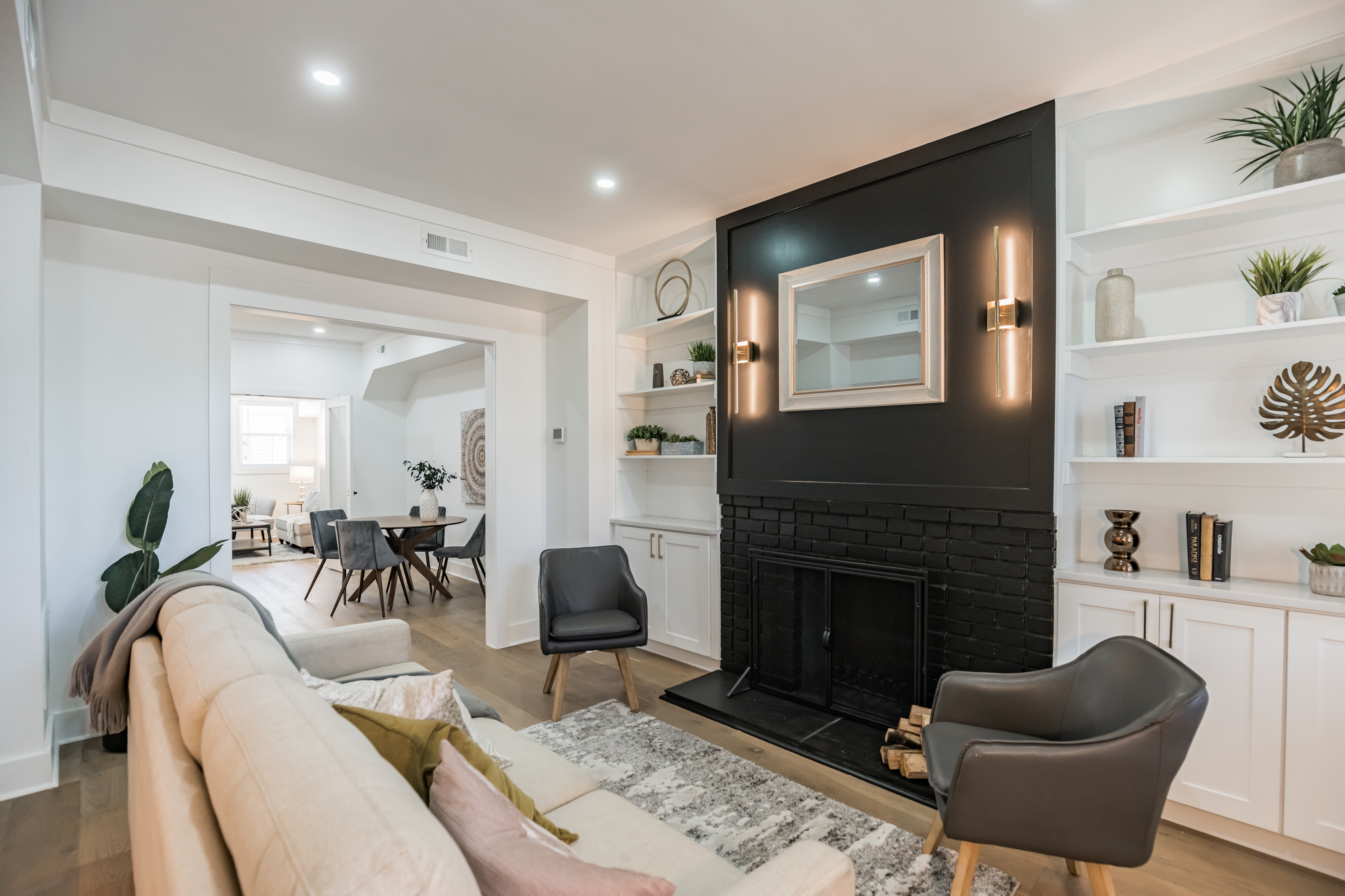
Differences between a Fixer-Upper and a Move-In Ready Home
Knowing the main distinctions between fixer-upper and move-in-ready houses is crucial when making this decision. Here are a few considerations to think about:
Major Factors to Consider
- Cost: Your choice may be determined by your budget. If all other things (like location) are equal, fixer-uppers will often be priced substantially lower than move-in-ready homes in market value. However, as we’ll discuss a little later, while you’re budgeting, there are other factors to take into account besides the sticker price.
- Resale Value: Consider your long-range objectives. If you intend to use the home as an investment or have plans to sell it in the future, it can be beneficial to consider its possible resale value beforehand. A fixer-upper that has been tastefully refurbished can perhaps repay more on investment.
- Time: A fixer-upper might not be the best choice for you if you must relocate right away. To make a property into your dream home, homeowners must invest time and money in fixing it up. You’ll probably be happier choosing a move-in-ready new house that enables you to settle in right away if your schedule doesn’t allow you to devote the necessary time.
- Location: Your options may be limited if you have your heart set on a specific location. There may only be move-in-ready alternatives in some areas, such as subdivisions. You might find it easier to find fixer-uppers in other areas, such as those near city centers where the homes are older.
- Expertise: It’s important to be sincere with yourself while choosing a house to purchase. While it’s common to love watching reality TV shows about home renovations, not everyone is qualified to execute one. Your decision is obvious if you are not skilled enough to tackle a fixer-upper project.
- Flexibility and Personalization: Fixer-uppers offer a chance for individualization and modification. You are free to create and update the area according to your personal style preferences. Although move-in ready homes are already completed, there might not be much space for significant changes, but you can still add your style with furniture and décor.
- Lower property taxes: If you buy a fixer-upper instead of a turnkey home, you’ll probably pay less in taxes because property taxes are based on the original purchasing price of the property.
There are instances where you can be more flexible, yet limitations in any of these categories may still force you to make a choice. In these situations, it’s worthwhile to examine the pros and cons of both solutions in more detail.
Pros and Cons of Buying Fixer-Uppers
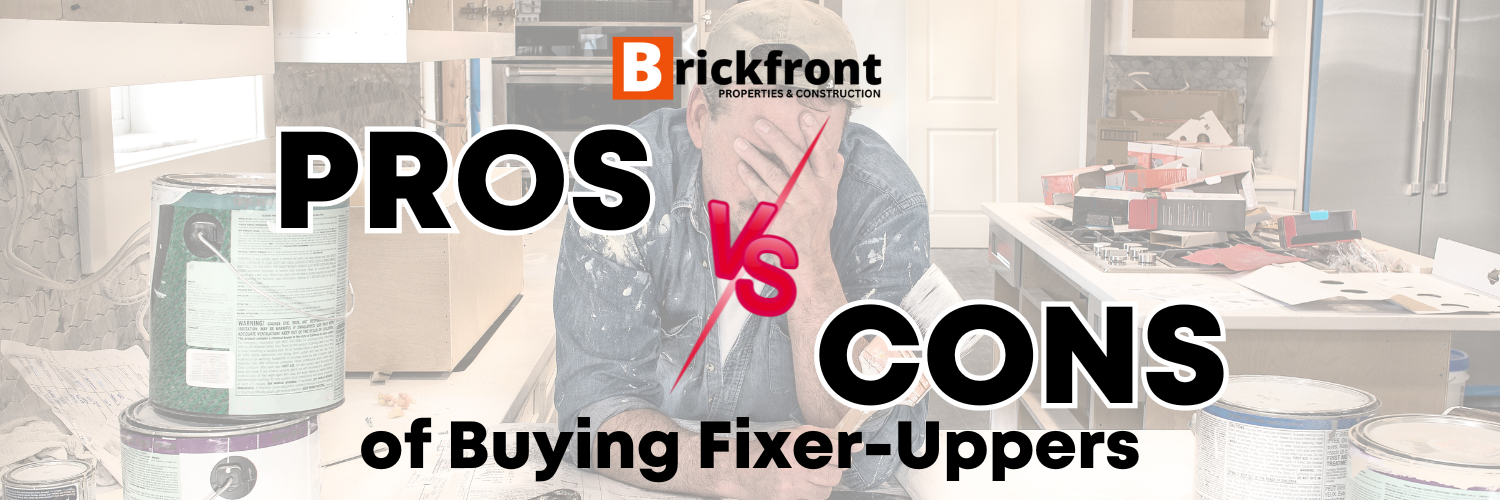
Pros
Purchasing a fixer-upper may prove to be financially advantageous in the long run, even if you employ contractors to handle the majority of the work. Here are a few benefits to think about.
You May Save on the Listing Price
First, let’s address the obvious: the cost of a fixer-upper will go down. In a bidding war, you’ll probably have less competition, and since the house probably needs some major repairs, the sellers won’t demand as much money.
Even if these factors are on your side, it’s still advisable to speak with a knowledgeable real estate agent.
To allow you to invest more money in renovations, a knowledgeable realtor or real estate agent can ensure that you get the greatest potential listing price when buying a fixer-upper.
Put plainly, cheaper homes are fixer-uppers. The substantial repairs and renovations that incoming homeowners will need to do in order to make the house habitable will reduce their worth.
Make Repairs Now Rather Than Later
Owning a home comes with a challenge in that things can go wrong at all times. You could need to replace your roof or smash your refrigerator.
One way to reduce the likelihood of future necessary repairs is to finish your renovation project as soon as you move into the house.
Along with other house repairs, most appliances have a lifespan of more than ten years. For several years, you can live in your house with peace of mind.
Potential for Increased Home Equity
You can raise the worth of the house and build your home equity while you take care of the required repairs. For instance, as of September 2023, the average price of a house is $406,700. A fixer-upper house could be worth more in the community if you can purchase it for significantly less than market value and perform the necessary renovations.
Depending on the market, your house may be worth a lot more when the time comes to sell it than what you paid for it. If you ever need to take out a home equity loan or home equity line of credit (HELOC), this is especially helpful. You can obtain an estimate of the value of your refurbished house and utilize that figure to obtain a home loan that meets your requirements.
Opportunity for Customization
Buying a fixer-upper has advantages beyond just saving money. That allows you to fully modify the house to suit your requirements.
To create a sense of fluidity, install a kitchen island or add new appliances from a reputable brand.
You can build a finished basement, redesign bathrooms, and plan an efficient home office.
In essence, you may turn a run-down house in a desirable neighborhood into the house of your dreams.
Although this is also feasible with a move-in ready home, given the current market purchase price, you might not have the funds to begin modifications right away.
Cons
It’s simple to get sucked into the romance of creating your ideal house and buying a fixer-upper at a lower cost. These homes do, however, have several possible hazards and disadvantages. Here are some things to be aware of when house hunting.
Unforeseen Repair Costs
When buying a fixer-upper, one of the most crucial things to do is to have the house thoroughly inspected. You should also consider getting a second opinion. The possibility that you find more or major issues with the house and have to spend on renovation costs is one of the biggest hazards.
For instance, you can find a black mold that needs to be handled immediately or a termite infestation. You may be surprised to learn that extensive plumbing repairs are really necessary for a cosmetic bathroom redesign.
These renovation total costs can be detrimental to your finances and cause emotional distress.
Financing and Insurance Hurdles
It may also be more difficult for you to get financing for your fixer-upper. Budgeting for the repairs will require you to pay for the property itself. Thankfully, you have a few choices to choose from in order to secure the money you require.
Getting insurance for a fixer-upper might also be beneficial. Hazards from the plumbing, electricity, roof, and even the materials themselves can raise the cost of your house insurance.
According to Mark Friedlander of the Insurance Information Institute, “Many older homes contain outdated electrical wiring and antiquated plumbing, which can create all types of hazards.” “And for an older home, the replacement costs are usually far higher than the property’s market value.”
Fortunately, since you have demonstrated that the house is secure, you may be eligible for reduced insurance premiums after you complete the renovations.
Time-Consuming Renovations
The length of time your renovations might take is something else to think about. Each job could take many months, depending on the availability of supplies, contractor schedules, and permit approval.
You will need to find temporary housing away from the home during this time, or you will have to reside in a construction zone.
Some homeowners have to pay high rental fees until their fixer-uppers are livable after spending more than a year fixing them.
Pros and Cons of a Move-In Ready House
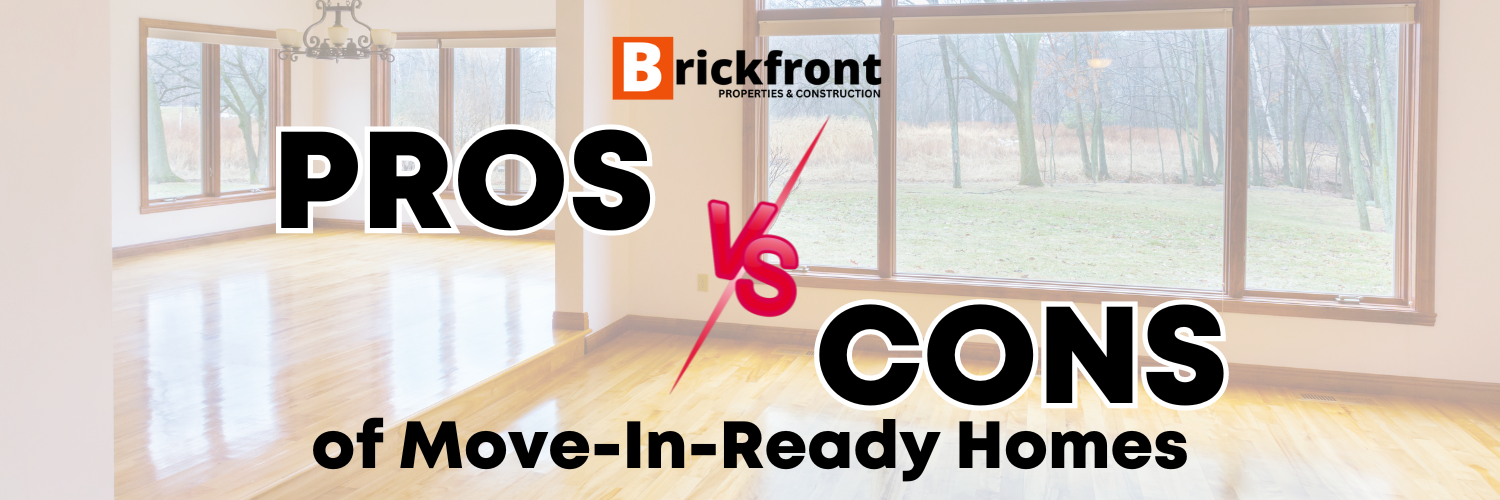
Pros
Investing in a move-in ready home is far easier than buying a fixer-upper. You can enjoy your new property right away by relocating to one of these properties. Here are a few explanations for why turnkey homes are so popular with purchasers.
Predictable Costs
Having a move-in ready home also means you won’t have to worry about unexpected costs being too expensive. You may look forward to a regular mortgage payment, consistent energy costs, and predictable costs for insurance and property taxes. A fixer-upper may have an unforeseen problem that results in a big price.
Even in cases when a home is move-in ready, Local DC Construction nevertheless advises allocating a little wiggle room of one to two percent of the property’s worth for repairs annually. You should budget about $900 a month if your home is worth $600,000 in case you need to make repairs.
Convenience and Immediate Comfort
Nearly every component of a home can become a hassle or an expense when it comes to fixer-uppers. If you run the washing machine, you might find that there is a serious plumbing problem. In contrast, a move-in ready home doesn’t require this.
The majority of the house should operate at its peak efficiency, but every home has problems and you will eventually need to fix several different things.
For those who are moving for work, or who are homeowners with children, this is the best choice. It won’t take long for you to settle into your new home and begin living there.
Modern Amenities and Energy Efficiency
Numerous move-in-ready homes have extras that make living there more pleasurable. Wi-Fi-enabled light switches, air conditioning, smart appliances, and energy-saving water heaters and pipelines may all be of service to you. In reality, according to 8% of homeowners, their homes are equipped with solar panels, which lower or eliminate their electricity costs. Choosing a turnkey house could provide you with all the luxuries you want.
Cons
Moving into a fixer-upper is simple, but purchasing one can present certain difficulties, particularly in a market where prices are high. The following are some issues that arise while purchasing a move-in ready home.
Less Room for Negotiation
Similarly, homeowners who offer their move-in ready homes are aware of their properties’ worth. They might not want to negotiate with you and won’t take lowball proposals. If other purchasers are prepared to pay the full amount, your haggling may be pointless.
Similarly, homeowners who offer their move-in ready homes are aware of their properties’ worth. They might not want to negotiate with you and won’t take lowball proposals. If other purchasers are prepared to pay the full amount, your haggling may be pointless.
Fixer-upper property owners frequently want to sell their homes as soon as possible, especially if they are in danger of going into foreclosure. Even though the home hasn’t been on the market for long, you might be able to negotiate a good offer.
Higher Purchase Price
To increase their property’s market worth, homeowners make improvements. The present seller will anticipate a higher sale price to cover their costs if they recently renovated the bathrooms, revamped the kitchen, or replaced their garage door.
Before searching for a move-in ready home, decide on a clear spending limit. Verify that you have enough money for the mortgage, interest, insurance, taxes, and, if necessary, homeowner’s association (HOA) dues. This will let you view houses that are appropriate for your needs.
Potential for Generic Finishes
A property may not fit your design aesthetic just because it is ready for occupancy. For instance, a lot of individuals have strong opinions on gray flooring, which has been in style for the last many years. You could buy a property and wish to tear out the brand-new gray floorboards right away.
Keep track of the amount for the renovation or remodeling project you would like to do once you move into a ready-to-move-in home. Some residences may seem like more work than they’re worth to you.
How To Finance a Fixer-Upper
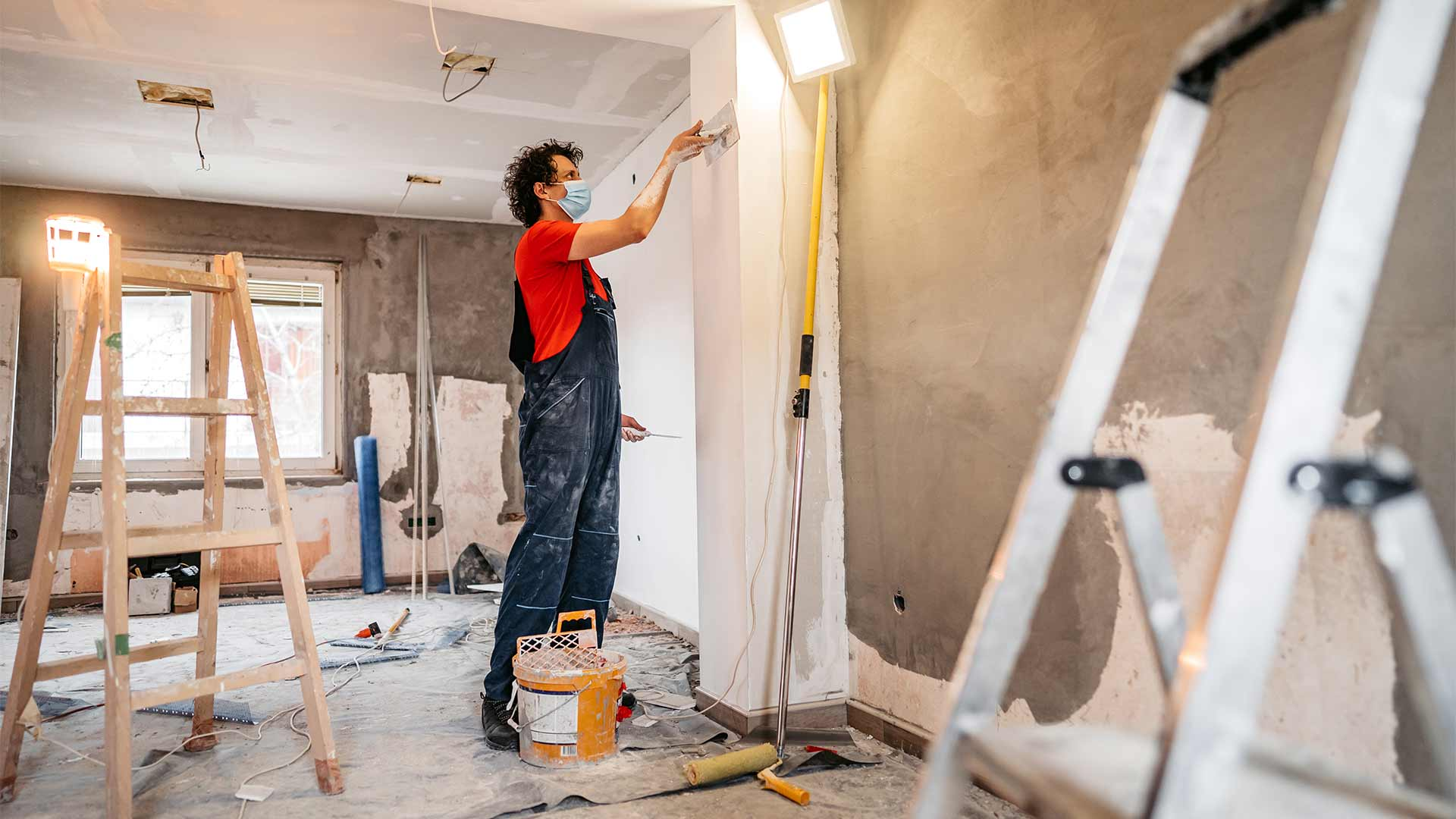
A fixer-upper can be financed in a variety of ways, such as through grants, loans, or special mortgages. Ready-to-occupy homes can also be financed in a variety of ways, but fixer-uppers cannot access the same specialized programs. These are a few instances of typical programs that can assist in financing a home improvement project.
FHA 203(k) Rehabilitation Loan
Through its 203(k) Rehabilitation Loan Program, the U.S. Department of Housing and Urban Development provides two different kinds of loans for rehabilitation. Homebuyers can finance substantial repairs worth at least $5,000, including demolition, with a regular 203(k) mortgage.2. Housing and Urban Development Department (HUD). “203(k) Rehab Mortgage Insurance.”
With the Limited 203(k) mortgage, purchasers can finance repairs and upgrades totaling up to $35,000 against their mortgage.1. The money might be used, for instance, to repaint or install new carpets, among other cosmetic fixes.
VA Loan
One benefit of mortgages from the U.S. Department of Veterans Affairs is that you can include the costs of repair and roll renovation in the loan amount. To be eligible for these loans, you must be a veteran, service member, or the surviving spouse of a veteran.
Personal Loans
You may prefer to use a personal loan, although this typically comes with a higher interest rate than mortgages.
Find Your Dream Home
Selecting whether to buy a fixer-upper or move-in-ready home can be difficult, and everyone will have a different response. Ultimately, it comes down to your willingness to take on a renovation job, your budget (which is a major factor), and your personal preferences. Every alternative has advantages, and by weighing the differences, you can make an informed decision that matches your objectives and your ideal home’s design.
Regardless of the path you choose, working with a reputable DMV realtor will undoubtedly help you maximize your financing options.
There are experts to support you throughout the entire homebuying process since we know the competitive market. These real estate agents are skilled professionals who can offer you advice and assist you when you want to buy a fixer-upper or move-in-ready property that meets your goals and needs.
